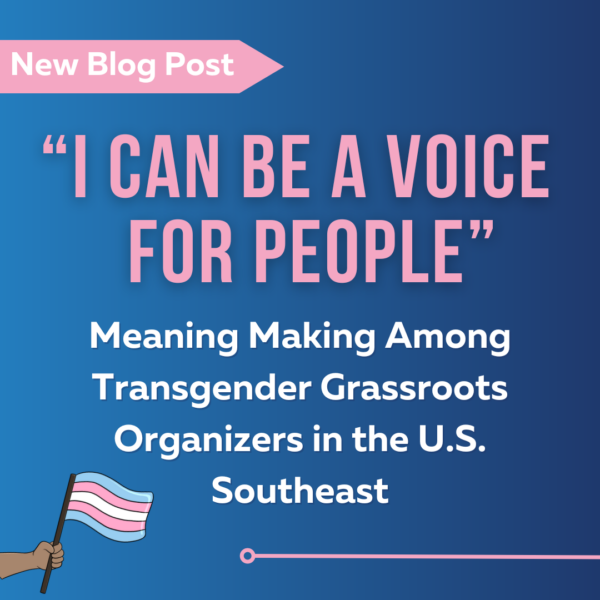 We are proud to share that two of our staff, Austin Johnson and Ivy Hill, recently worked with a team of researchers to publish an academic article exploring the experiences of transgender grassroots organizers in the South. The article, titled “I Can be a Voice for People”: meaning making among transgender grassroots organizers in the U.S. Southeast”, shows the depth of support that transgender people provide to their own communities as larger societal structures and organizations fail them. The research, based in 15 qualitative interviews with grassroots transgender organizers, found that organizers feel called to this work based on their own personal experiences. In the words of white, 62-year old trans man who organizes a makeshift trauma recovery center in Florida:
We are proud to share that two of our staff, Austin Johnson and Ivy Hill, recently worked with a team of researchers to publish an academic article exploring the experiences of transgender grassroots organizers in the South. The article, titled “I Can be a Voice for People”: meaning making among transgender grassroots organizers in the U.S. Southeast”, shows the depth of support that transgender people provide to their own communities as larger societal structures and organizations fail them. The research, based in 15 qualitative interviews with grassroots transgender organizers, found that organizers feel called to this work based on their own personal experiences. In the words of white, 62-year old trans man who organizes a makeshift trauma recovery center in Florida:
When I transitioned, I felt alone. The term ‘transgender’ was just starting to come into use. So, before it came to use I had no idea who or what I was. I knew who I was, I knew whatI looked like, but there was no label, there was no box to put myself into. And, when I came out, I was still alone. I didn’t know any LGBTQ people. And at that point I swore to myself that I would do something about people feeling alone, I would do that. I would make sure that they did not feel alone. I know how and am able to do that now.
Trans organizers also found strength in being local and rooted in community need. Having gone through many of the same struggles as their community, and knowing their community deeply, helped to ground their work. In the words of one white, 68-year old, trans woman who organizes trans people without access to stable housing in Virginia:
The main thing about grassroots organizing is that community part or that personal piece, when you know the folks who are showing up. You know what they’re struggling with. You know that they may need help with something else, and not necessarily what the meeting is about. You can message people, reach out. One day, we were supporting a trans woman to find housing. We were messaging folks and asking who can house her for tonight? And, then, who can bring a meal this weekend? Like, having people sign up for, like, “I’ll do breakfast,” “I’ll do lunch,” “I’ll do dinner.” That takes building trust and building community to be able to do that.
Trans grassroots organizers also discussed heavily the ways in which their work is limited by lack of capacity and financial resources. A Latinx, 24-year old, nonbinary organizer in Arkansas explained:
Bigger orgs have a huge following and way more, way more of an audience or way more support. And I see these people really promote other straight white people, and other straight white movements and organizations. And, you know, I’m like, well, you know, we’re right here, could you just like, give us a little boost? Like put us on your website, like, say that we’re doing this work and that we need support? Because you know, it’s hard to get funding, especially when we don’t have a lot of outside sources that are funding us. A lot of it is us doing our own fundraising or using our own money.
Overall, the researchers conclude that trans grassroots organizers need more resources to sustain grassroots work in their communities, and to create a livable environment in the U.S. Southeast for trans people. You can read the full article here.

